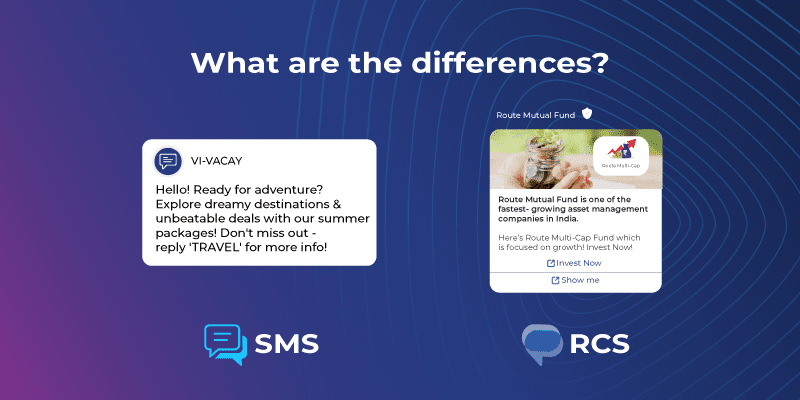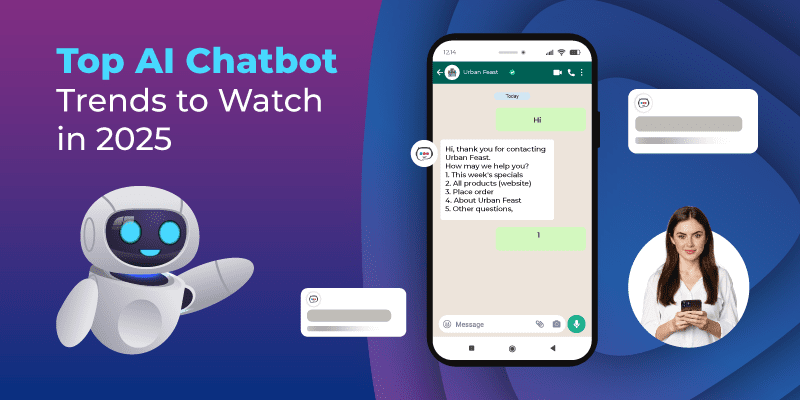Both RCS and SMS are promising messaging channels for businesses to reach out and engage with their customers.
16 million SMS messages are sent every minute worldwide. 90% of them read their text within 3 minutes of delivery. RCS, on the other hand, has gained popularity with its rich messaging features since its launch in 2008.
Both continue to prove to be effective communication channels. Businesses without any clarity on what these services have to offer, what the difference between the two, and whether to choose one or both will most probably lose out on both opportunities.
This article solves that for you! We dive deep into comparing the differences between RCS and SMS for business communication.
Table of Contents:
-
What Is RCS?
- Key Features Of RCS
- Benefits of RCS
- What Is SMS?
- Key Features Of SMS
- Benefits of SMS
-
Difference Between RCS and SMS
- How Is RCS Different From SMS?
- How SMS Is Different From RCS?
-
Comparing RCS vs SMS
- Functionality
- Reach
- Delivery Confirmation
- Network Dependency
- Security
- Cost
- Integration Capabilities
- Rich Media
- Conclusion
- FAQs
What Is RCS?
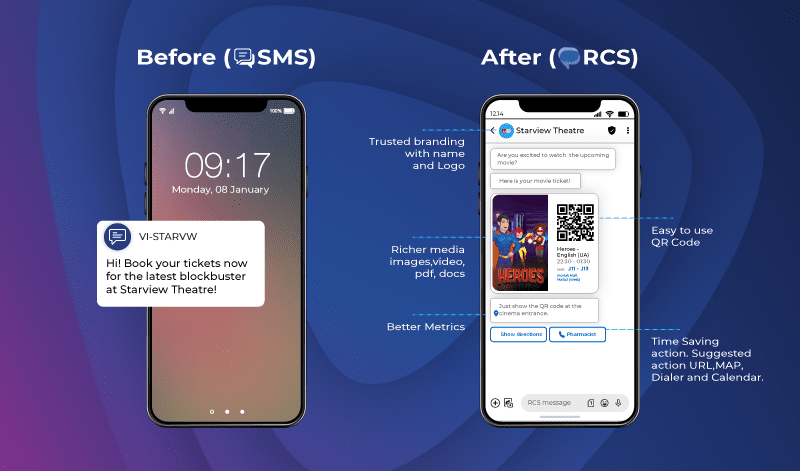
RCS stands for Rich Communication Services. It is the next-generation IP-based messaging protocol designed to upgrade SMS, offering more interactivity, better user experience, and richer media.
Unlike traditional messaging protocols, SMS is more like modern messaging applications such as WhatsApp and Facebook Messenger.
The global RCS messaging market is expected to hit a valuation of $8.5 billion by 2031 with a CAGR of 16%.
The service is provided by the operator networks, often used for both Application-to-Person (A2P) and Person-to-Person (P2P) communication.
For A2P communication, RCS, formally known as RCS Business Messaging (RBM), is a service provided by top reputed cloud-communication service providers like Route Mobile.
Key Features Of RCS
- Support rich media content
- Encrypted messages for privacy and security
- Verified sender
- Visually appealing rich media cards
- Branded messages
- Suggested replies for better conversion
- Advanced analytics
Benefits of RCS
Here’s what is best about RCS:
- Send rich and interactive media to enhance customer experience and more customer engagement
- Measure transactions to analyse marketing campaigns
- Ability to target a specific group for more personalised communication
- Can directly interact with customer’s native messaging application
- No delay in message deliverability
- Easier to keep customers informed about the products and services with real-time updates, alerts, confirmations, and notifications.
Must Read: RCS Business Messaging And The Benefits Of Rich Media
What Is SMS?
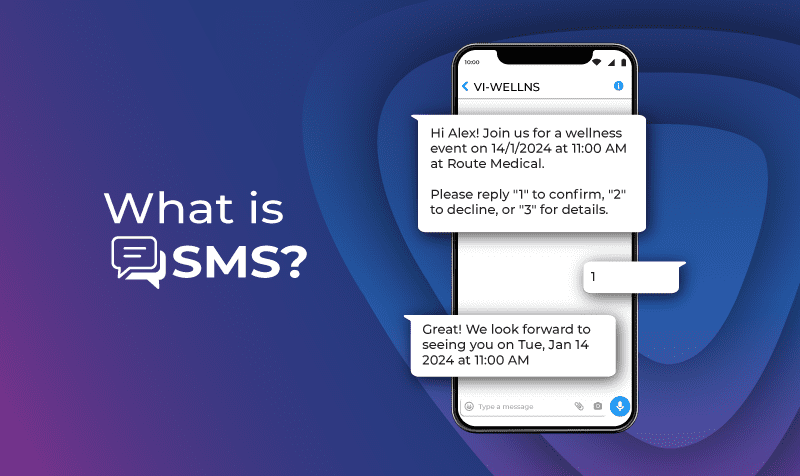
SMS stands for Short Messaging Service. It is a messaging protocol for sending and receiving short text messages over the mobile carrier network. SMS does not require an internet connection, data plan, or any additional application to download. Telecom carriers may charge for every SMS send where receiving is free.
This is a traditional form of text messaging introduced back in the 1990s, and since then, it has been widely popular due to its simplicity, ease of use, and reliability.
Key Features Of SMS
- Real-time messaging/marketing channel
- Send bulk SMS
- Omnipresent
- Targeted and personalised communication
- API integration
- Two-way messaging
- Highly scalable
- Dedicated virtual number ( like shortcode or 10DLC)
- Cost-effective solution
- Automation
- High ROI
Benefits of SMS
Here’s what’s best about SMS:
- The most convenient and fastest method to reach out to the audience
- Simplicity and efficiency make it a universal communication channel
- Access to a large audience, basically everyone with a mobile phone
- Boast high open rates and customer engagement
- Highly cost-effective and low-complexity solution
- Offer much better personalisation for SMS marketing
Difference Between RCS and SMS
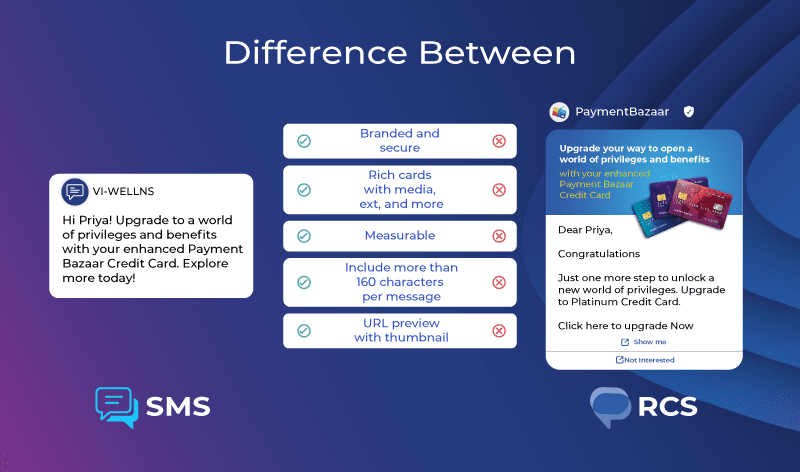
How Is RCS Different From SMS?
RCS business messaging is an upgraded messaging protocol compared to traditional SMS messages. Unlike SMS, which only supports text, this type of messaging supports rich media content like images, videos, GIFs, interactive buttons, carousels, etc.
It allows businesses to craft much more interactive and engaging messages, offering a better user experience for customers.
How SMS Is Different From RCS?
SMS is a traditional yet effective way of sending and receiving messages in the form of simple and limited-character text. It focuses primarily on delivering a short, brief, and essential message that increases the convenience of accessing and reading.
There is a reason why transactional messages and other essential messages from brands are sent through SMS, specifically notifications, alerts, transactions, OTP verifications, etc.
Comparing RCS vs SMS
Functionality
SMS allows users to only send a message with a strict character limit of 160 without any media capabilities. RCS, on the other hand, supports a wide range of rich media such as images, GIFs, audio, and video.
Also, there is no character limit. RCS messages can be sent from one to many. SMS’s core functionality lies within its brief and short messages, making it highly convenient, simple, and direct for users to access.
Reach
What truly stands out about SMS is its universal reach. Since every mobile phone can receive and send SMS without any extra app or internet, every mobile phone user is a potential customer.
With RCS, businesses can leverage advanced interactivity and rich media features for high customer engagement. However, the reach for RCS is limited to devices where the RCS feature is enabled.
Delivery Confirmation
The delivery confirmation abilities you get with SMS are few and largely dependent on the network carrier’s settings. Mostly, it notifies the sender that the message is delivered successfully.
With RCS, you get more advanced and detailed features that share more details about the delivery of messages, such as whether they have been read or not.
Network Dependency
With RCS messaging, users require data connectivity to transmit it. However, SMS does not need an internet connection, and thus, it is not dependent on the network.
This makes SMS a highly reliable communication channel as it increases deliverability. However, it is also essential to address the fact that internet connectivity today is readily available almost everywhere in the world.
Security
SMS messages are not encrypted or secured, leaving an oppurtunity for potential message interception or other security risks related to privacy.
RCS, however, utilise several security components, such as transport layer security for encryption and other security-based protocols.
Cost
RCS comes with more features, but it also requires a higher budget from businesses to establish. For small businesses, it can be challenging to meet at such a price point, especially the ones with limited budgets.
SMS, on the other hand, comes with a simple feature, a cost-effective solution for business communication. Since the SMS service is basically bundled with mobile plans offered by network carriers, the cost of integration becomes extremely low.
Integration Capabilities
Since SMS uses the carrier’s cellular network to send and receive messages, integrations are limited.
However, RCS uses IP, like any other messaging application, offering much more sophisticated integration capabilities with other services/systems, including chatbots, CRM systems, marketing automation platforms and more.
Rich Media
RCS excels in its ability to utilise rich media and interactive content. It helps businesses to create a much more engaging user experience. However, this is only possible when the sender and the recipient both have enabled the RCS feature.
With SMS, businesses can only send plain text with limited characters, and it doesn’t support rich media or interactivity. However, with SMS, businesses can be assured of their simplicity and reliability, making it universal in communication.
Read More: Will RCS Replace SMS by 2025 As Dominant Text Message System
Conclusion
SMS and RCS both have their distinct characteristics and strengths for business. They are not mutually exclusive but rather complementary to each other.
Companies must focus on leveraging both communication channels for their strength, i.e., simplicity, reliability, and wide adoption of SMS and rich media features and interactivity capabilities with RCS.
Businesses must expect high user engagement, improved customer satisfaction, and dynamic messaging when choosing RCS.
With SMS, they are opting for a legacy channel with extraordinary open rates, reach, and deliverability, catering to an even larger audience.
Consult a reputed business services provider like Route Mobile, a leading cloud communication platform as a service brand offering SMS and RCS, both messaging services. Contact our experts to guide you further!
FAQs
What’s The Difference Between RCS And SMS Messaging?
SMS is a traditional method of messaging offering the most simple, reliable and convenient way of communication, sending simple text messages. In contrast, RCS offers advanced messaging features like rich media and interactivity for more customer engagement.
How Businesses Send RCS Messages To Their Customers?
Businesses can send RCS messages to their customers by choosing a messaging platform or collaborating with a communication platform as a service (CPaaS) provider. They provide companies with the required infrastructure to send and manage messages on a large scale.
What Businesses Should Choose Between RCS and SMS?
RCS and SMS are not mutually exclusive; they are complementary to each other when used within a strategic business communication/marketing campaign. Enterprises must leverage both of these channels for maximum customer outreach engagement and an omnichannel presence.

